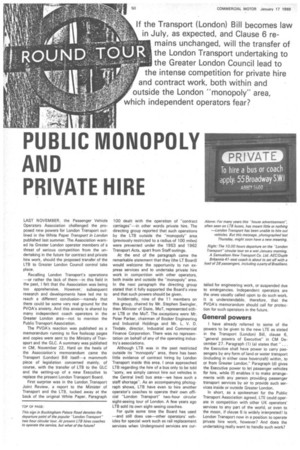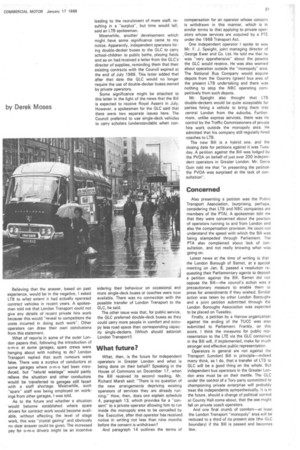PUBLIC MONOPOLY AND PRIVATE HIRE
Page 52

Page 53

If you've noticed an error in this article please click here to report it so we can fix it.
LAST NOVEMBER, the Passenger Vehicle Operators Association challenged the proposed new powers for London Transport outlined in the White Paper Transport in London published last summer. The Association warned its Greater London operator members of a threat of serious competition from the undertaking in the future for contract and private hire work, should the proposed transfer of the LTB to Greater London Council control take place.
Recalling London Transport's operations —or rather the lack of them—in this field in the past, I felt that the Association was being too apprehensive. However, subsequent research and developments have led me to reach a different conclusion—namely that there could be some very real ground for the PV0A's anxiety. And this anxiety is shared by many independent coach operators in the Greater London area—not to mention the Public Transport Association.
The PV0A's reaction was published as a memorandum running to five foolscap pages and copies were sent to the Ministry of Transport and the GLC. A summary was published in CM, November 22. Hard on the heels of the Association's memorandum came the Transport (London) Bill itself----a mammoth piece of legislation concerned mainly, of course, with the transfer of LTB to the GLC and the setting-up of a new Executive to replace the present London Transport Board.
First surprise was in the London .Transport Joint Review, a report to the Minister of Transport and the LTB, tucked away at the back of the original White Paper. Paragraph TOP OF PAGE:
This sign in Buckingham Palace Road denotes the departure point of the popular "London Transport" two hour circular tour. At present LTB ivies coaches to operate the service, but what of the future?
100 dealt with the operation of "contract carriages"—in other words private hire. The directing group reported that such operations by the LTB outside the "monopoly" area (previously restricted to a radius of 100 miles) were prevented under the 1953 and 1962 Transport Acts, apart from Staff outings.
At the end of the paragraph came the remarkable statement that they (the LT Board) would welcome the opportunity to run express services and to undertake private hire work in competition with other operators, both inside and outside the "monopoly" area. In the next paragraph the directing group stated that it fully supported the Board's view and that such powers should be given.
Incidentally, nine of the 11 members on this group, chaired by Mr. Stephen Swingler, then Minister of State, MoT, represented either LTB or the MoT. The exceptions were Mr. Peter Parker, chairman of Booker Engineering and Industrial Holdings and Mr. L. V. D. Tindale, director, Industrial and Commercial Finance Corporation. There was no representation on behalf of any of the operating industry's associations.
Although LTB was in the past restricted outside its "monopoly" area, there has been little evidence of contract hiring by London Transport inside this area. I once approached LTB regarding the hire of a bus only to be told "sorry, we simply cannot hire out vehicles in the Central (red) bus area—we have such a staff shortage". As an accompanying photograph shows, LTB have even to hire another operator's coaches to operate their own official "London Transport" two-hour circular sight-seeing tour of London. A few years ago LTB sold its own sight-seeing coaches.
For quite some time the Board has used —and still does use—other operators' vehicles for special work such as rail replacement services when Underground services are cur
tailed for engineering work, or suspended due to emergencies. Independent operators are the ones usually called upon to do such work. It is understandable, therefore, that the PV0A's memorandum should call for protection for such operators in the future.
General powers
I have already referred to some of the powers to be given to the new LTE as stated in the Transport (London) Bill, clause 6, "general powers of Executive" in CM December 27. Paragraph (1) (a) states that"
the Executive shall have power to carry passengers by any form of land or water transport (including in either case hovercraft) within, to or from Greater London." Paragraph (d) gives the Executive power to let passenger vehicles fOr hire, while (f) enables it to make arrangements with any person providing passenger transport services by air to provide such services inside or outside Greater London.
In short, as a spokesman for the Public Transport Association agreed, LTE could operate in competition with other UK operators' services to any part of the world, or even to the moon, if clause 6 is widely interpreted! Is London Transport now in a position to operate private hire work, however? And does the undertaking really want to handle such work? Believing that the answer, based on past experience, would be in the negative, I asked LTB to what extent it had actually operated contract vehicles in recent years. A spokesman told me that London Transport could not give any details of recent private hire work because this would "reveal to competitors the costs incurred in doing such work". Other operators can draw their own conclusions from this statement.
What of reports in some of the outer London papers that, following the introduction of o-m-o at some garages, spare crews were hanging about with nothing to do? London Transport replied that such rumours were false. There was a surplus of conductors at some garages where o-m-o had been introduced, but "natural wastage" would partly relieve the situation and other conductors would be transferred to garages still faced with a staff shortage. Meanwhile, such "spare" staff was being employed on workings from other garages, I was told.
As to the future and whether a situation would bacome established where spare drivers for contract work would become available, without affecting the level of stage work, this was "crystal gazing" and obviously no clear answer could be given. The increased pay for o-m-o drivers might be an incentive leading to the recruitment of more staff, resulting in a "surplus", but time would tell, said an LTB spokesman.
Meanwhile, another development which might have some significance came to my notice. Apparently, independent operators hiring double-decker buses to the GLC to carry school-children to public baths, playing fields and so on had received a letter from the GLC's' director of supplies, reminding them that their existing contracts with the Council expired at the end of July 1969. This letter added that after that date the GLC would no longer require the use of double-decker buses owned by private operators.
Some significance might be attached to this letter in the light of the news that the Bill is expected to receive Royal Assent in July. However, a spokesman for the GLC said that there were two separate issues here. The Council preferred to use single-deck vehicles to carry scholars (understandable when con sidering their behaviour on occasions) and more single-deck buses or coaches were now available. There was no connection with the possible transfer of London Transport to the GLC, he said.
The other issue was that, for public service, the GLC preferred double-deck buses as they could carry more people in comfort and occupy less road space than corresponding capacity single-deckers. (Which should astonish London Transport!)
What future?
What, then, is the future for independent operators in Greater London and what is being done on their behalf? Speaking in the House of Commons on December 17, when the Bill received its second reading, Mr. Richard Marsh said: "There is no question of the new arrangements depriving existing operators of services they are already running." How, then, does one explain schedule 4, paragraph 13, which provides for a "consent" to a private operator allowing him to run inside the monopoly area to be cancelled by the Executive, after that operator has received notice in writing not less than nine months before the consent is withdrawn?
And paragraph 14 outlines the terms of compensation for an operator whose consent is withdrawn in this manner, which is in similar terms to that applying to private operators whose services are acquired by a PTE under the 1968 Transport Act.
One independent operator I spoke to was Mr. F. J. Speight, joint managing director of George Ewer and Co. Ltd. He told me that he was "very apprehensive" about the powers the GLC would receive. He was also worried about operation outside the "monopoly" area. The National Bus Company would acquire depots from the Country (green) bus area of the present LTB undertaking and there was nothing to stop the NBC operating competitively from such depots.
Mr. Speight also thought that LTB double-deckers would be quite acceptable for parties hiring a vehicle to bring them into central London from the suburbs. Furthermore, unlike express services, there was no control by the Traffic Commissioners of private hire work outside the monopoly area. He admitted that his company still regularly hired coaches to LTB.
The new Bill is a hybrid one, and the closing date for petitions against it was Tuesday. A petition against the Bill was lodged by the PVOA on behalf of just over 200 independent operators in Greater London. Mr. Denis Quin told roe that "in presenting the petition the PVOA was surprised at the lack of consultation".
Concerned
Also presenting a petition was the Public Transport Association, (surprising, perhaps, considering that LTB and NBC companies are members of the PTA). A spokesman told me that they were concerned about the position of operators running to and from London and also the compensation provision. He could not understand the speed with which the Bill was being stampeded through Parliament. The PTA also complained about lack of consultation, and not really knowing what was going on.
Latest news at the time of writing is that the London Borough of Barnet, at a special meeting on Jan. 8, passed a resolution requesting their Parliamentary agents to deposit a petition against the Bill. Barnet did not oppose the Bill—the council's action was a precautionary measure to enable them to press for amendments if they wished. Similar action was taken by other London Boroughs and a joint petition submitted through the London Boroughs Association was expected to be placed on Tuesday.
Finally, a petition by a Harrow organization against the ending of the TUCC was also submitted to Parliament. Frankly, on this score, I think the measures for public representation to the LTE via the GLC contained in the Bill will, if implemented, make for much stronger and effective public representation.
Operators in general are not against the Transport (London) Bill in principle—indeed many think, as I do, that a transfer of LTB to GLC will be a good thing on the whole. But independent bus operators in the Greater London area must be on their mettle. The GLC under the control of a Tory party committed to championing private enterprise will probably treat the independents sympathetically. It is in the future, should a change of political control at County Hall come about, that the axe might fall on private coach operators.
And one final crumb of comfort—at least the London Transport "monopoly" area will be reduced to a third of its present size (the GLC boundary) if the Bill is passed and becomes law,








































































































